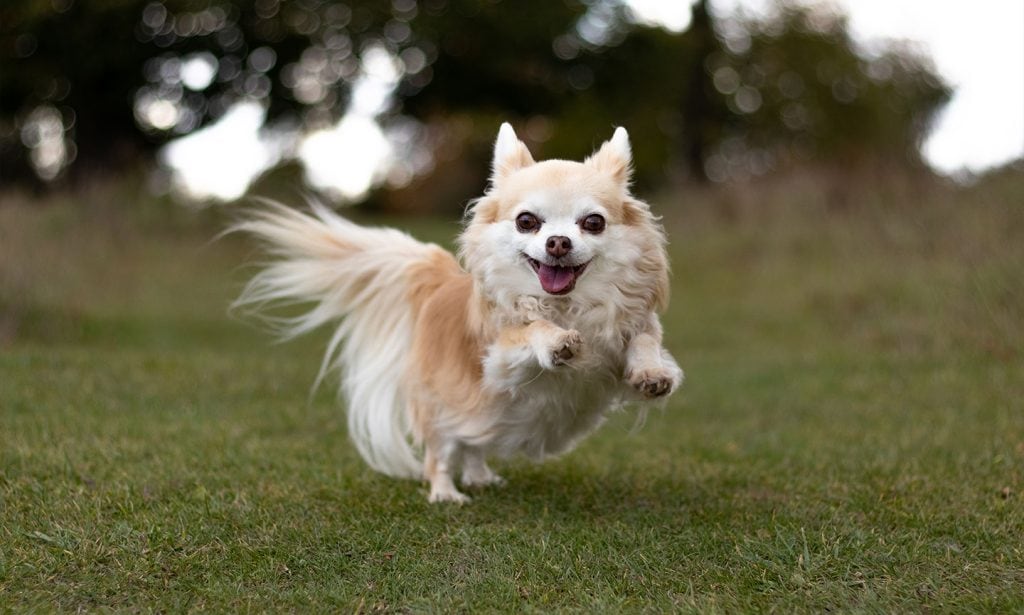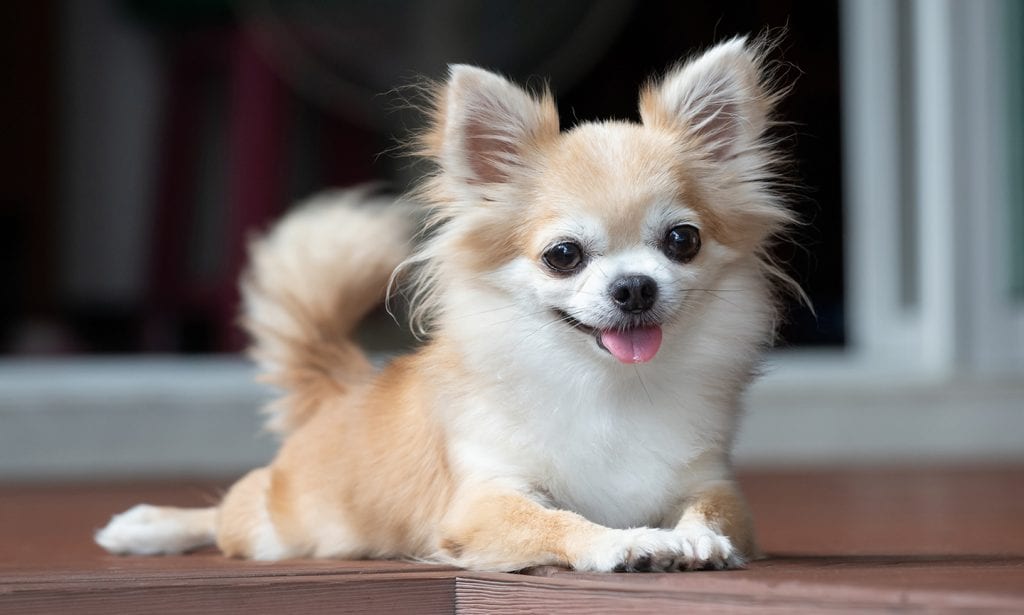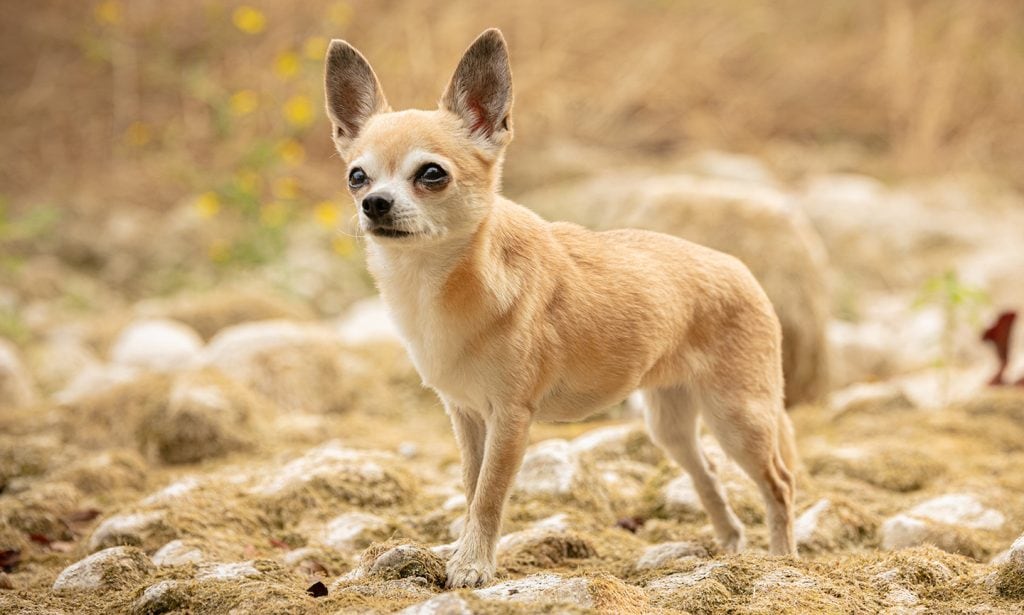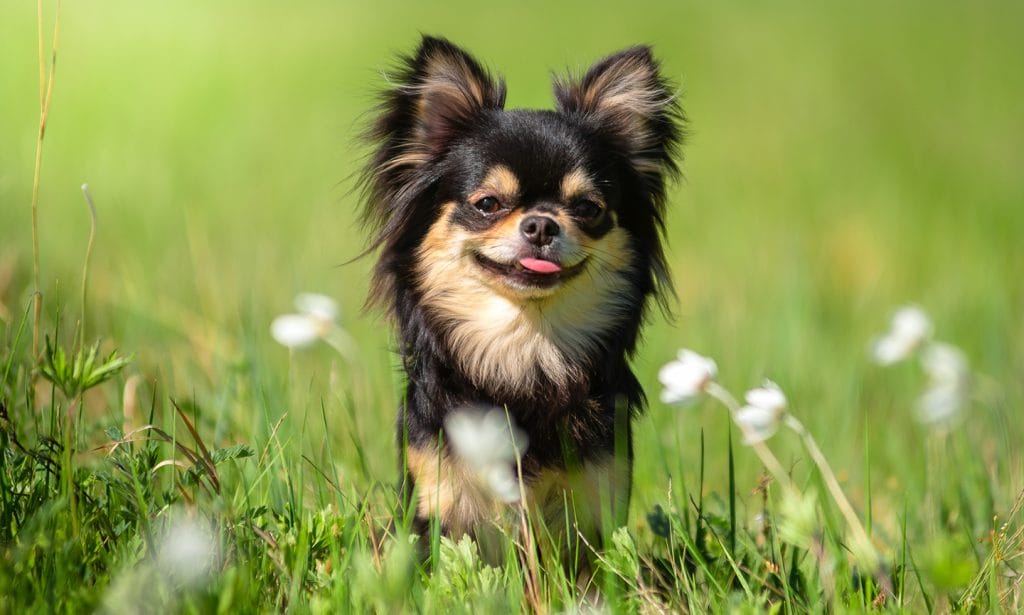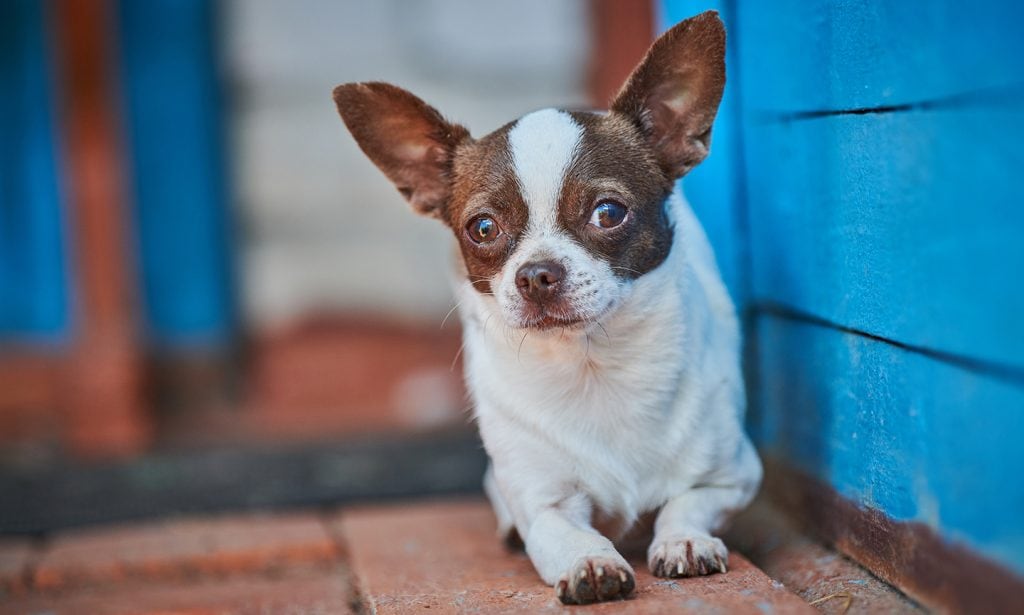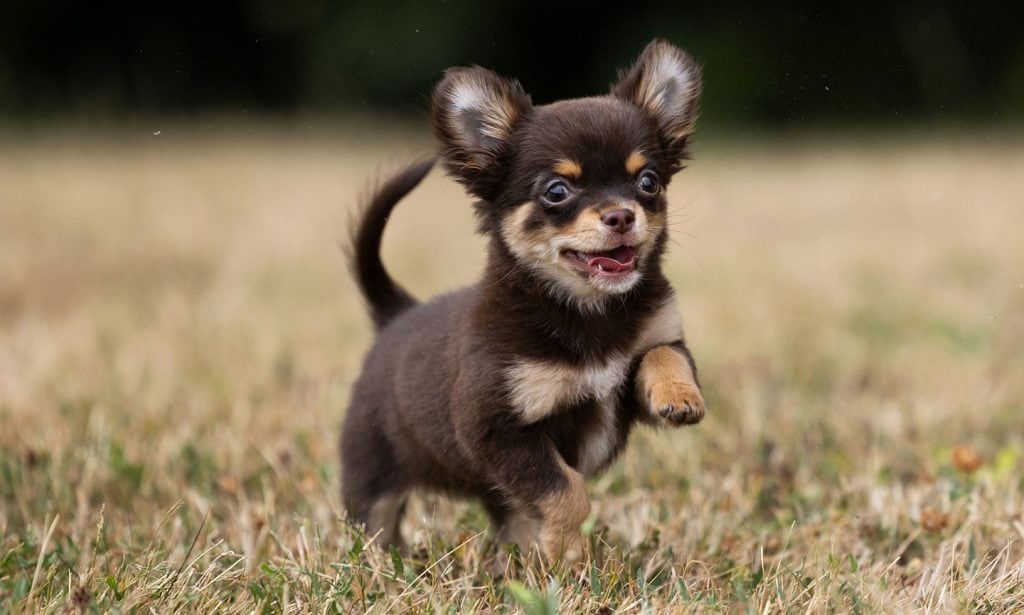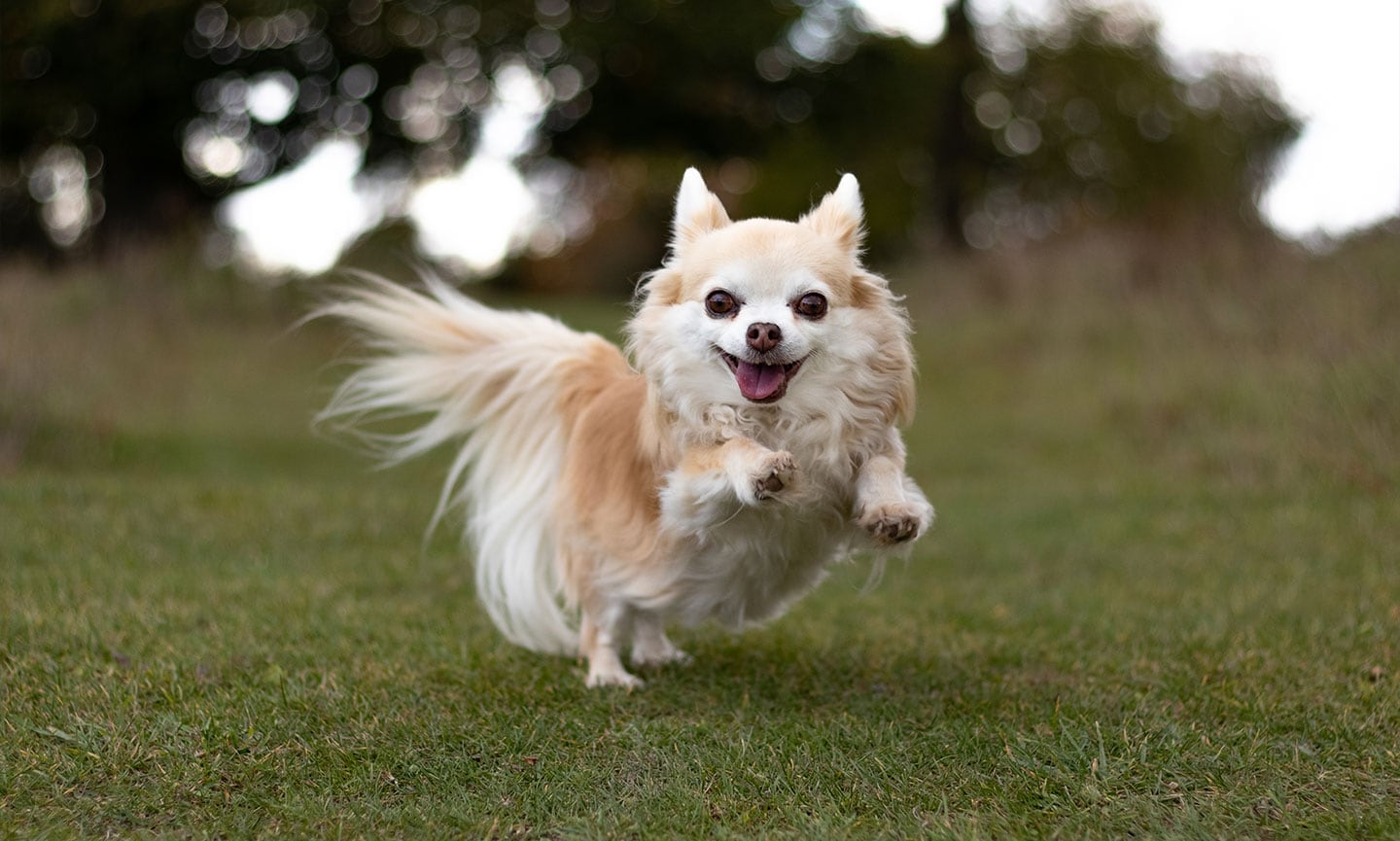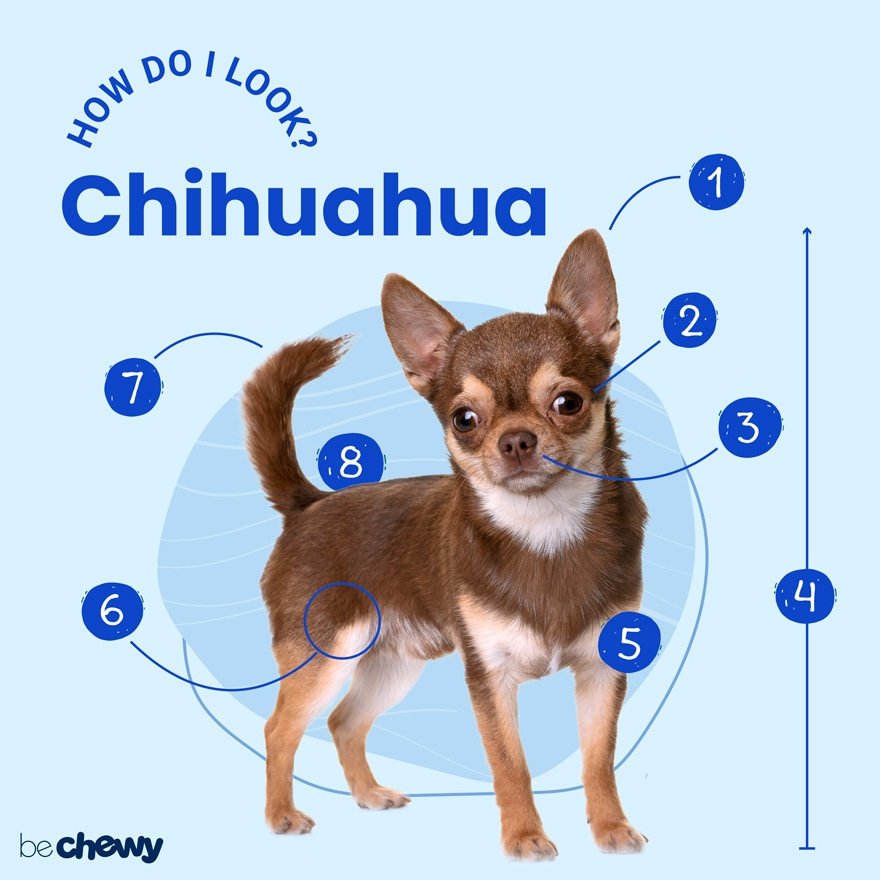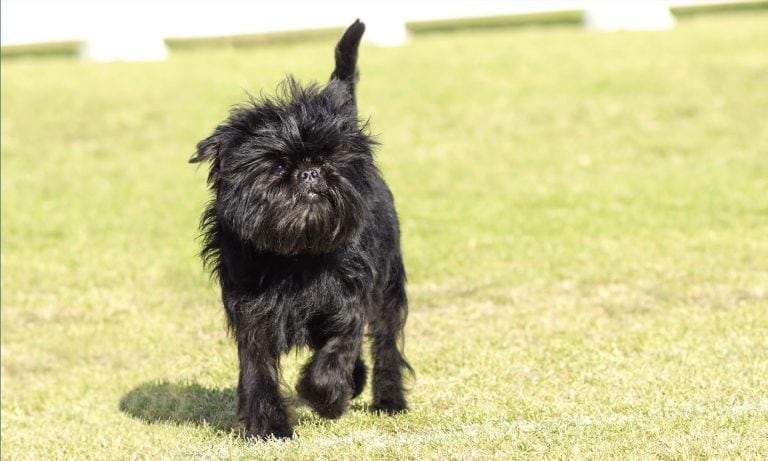A large dog in a small dog’s body, the Chihuahua is a toy breed with a great big heart and an even bigger personality. This tiny lap dog is like a little magnet, attracting many admirers with their small stature, soulful eyes and expressive ears. But while the Chihuahua breed is affectionate and bonded to their humans, they can react with force when they feel intimidated by strangers, so proper socialization and training is a must. Equal parts sassy and sweet, these pint-sized pups make great companions for first-time and experienced pet parents alike.
Breed Snapshot
Temperament:
CharismaticBig Dog EnergyCheekyCoat Color:
BlackBlack And TanBlue And TanChocolateChocolate And TanCreamFawnFawn And WhiteRed
Best For
Equal parts affectionate, charming and mischievous, Chihuahuas are small, adaptable dogs who thrive in households (small and large!) with no other dominant pets. This toy breed's ideal pet parent provides companionship, care and lots of attention.
Chihuahua Temperament
Chihuahuas are charming little scamps with an eye for mischief and a sense of bravery that outsizes their physicality. They’re playful pups who enjoy a good romp or game, even though it may not last long (depending on their energy level). And they love to snooze on laps and cuddle—that is, after all, what they’re bred to do.
They like a lot of attention and are quite portable. But even though they’re easily carried, they do still need to learn how to walk on their own and be able to engage in normal dog behaviors, like sniffing, exploring and playing. In other words, don’t pop them in a purse or a stroller and tote them everywhere—unless, of course, it’s somewhere risky with lots of feet that could hurt a tiny paw, like an airport or street festival.
The Chihuahua dog breed is said to resemble a terrier with their demeanor and can become quite feisty, especially if they feel threatened. Some sites report that the Chihuahua bite force is 3,900 pounds per square inch (psi), but those so-called Chihuahua facts are wildly inaccurate, when a lion is only at 600 psi. In truth, Chihuahuas usually inflict no more than a Level 1-3 bite, with no puncture deeper than half the length of one of their canine teeth.
To help your Chihuahua puppy overcome a nipping or protective tendency, socialize them by safely and slowly introducing them to new people and places from the get-go and start training when they are young. Early training will also help this smallest of dog breeds become wonderfully friendly and receptive to all members of the family, including other pets.
How to Care for a Chihuahua
A Chihuahua puppy or adult, with their petite proportions and ease of portability, is easy to think of as low maintenance. In reality, Chihuahuas require daily exercise, regular grooming with special attention to dental and eye care, and early socialization and training. They are dogs—not toys—after all. The good news is they are so little, that grooming doesn’t take very long to get through. And they’re smart dogs who take well to proper training and socialization.
Chihuahua Health
Even though they have a life expectancy of 14-16 years, Chihuahuas are not without their health problems. Like many dogs who have been bred for millennia, Chihuahuas come with their own unique set of health issues.
- Patellar Luxation: Also known as luxating patella, this condition occurs when the kneecaps slip or dislocate. Treatment may range from joint supplements and pain medication to surgery, in severe cases.
- Hypoglycemia (low blood sugar): Because tiny dogs have very little fat storage, their blood sugar bottoms out easily. Symptoms include lack of energy, weakness, disorientation, tremors and, in severe cases, seizures. To help your Chi avoid developing hypoglycemia, you may need to offer multiple small meals throughout the day, especially when they’re puppies.
- Bladder Stones: The Chihuahua is more likely than other breeds to develop bladder stones. Symptoms include smelly or bloody urine, inability to urinate, frequent urination and accidents in the house. Surgery may be required to remove the stones. To prevent them or minimize your Chi’s chance of developing bladder stones, talk with your veterinarian about possible changes to your pup’s diet.
- Portosystemic Shunt (PSS): In this disorder, the blood supply that’s supposed to go to the liver is shunted or diverted. Then, toxins build up. If your Chihuahua is not growing properly or has seizures, make sure your vet checks for this condition, which is typically treated with diet and medication or, in severe cases, surgery.
- Heart Disease and Other Cardiac Issues: Heart disease is a leading cause of death for this smallest breed. Chihuahuas are susceptible to several conditions, including mitral valve disease and Patent Ductus Arteriosis (PDA). Symptoms include coughing, fatigue, weakness, a heart murmur and weight loss. If you suspect your Chihuahua is having issues with their heart or your vet hears a heart murmur, they may need to see a veterinary cardiologist for an echocardiogram (ultrasound of the heart).
- Hydrocephalus: Because of the shape of their heads, Chihuahuas are susceptible to improperly fused skull bones which can lead to excess fluid around the brain. This can result in an increase in intracranial pressure. Symptoms include seizures, circling and an improper gait. When caught early, medications can often be used to treat the condition. In some instances, surgery is needed.
- Epilepsy: Chihuahuas can have seizures for several reasons, but if there’s no underlying disorder, then idiopathic epilepsy may be diagnosed. Treatment is typically daily medication.
- Eye Issues: Chihuahuas have big puppy dog eyes, making them more prone to eye issues. Common eye issues include dry eye (keratoconjunctivitis sicca or KCS), glaucoma, cataracts and corneal ulcers. If you notice any signs of eye problems, such as redness, cloudiness, squinting, bulging or pain, please see your veterinarian immediately.
- Periodontal Disease: Extremely common in Chihuahuas by the age of 2, periodontal disease begins with tartar build-up and leads to gum infections and tooth loss. If not treated, the bacteria can get in the blood stream and affect the heart, liver and kidneys. Daily teeth brushing and regular dental checkups by your vet are key to preventing this disease.
Chihuahua History
Chihuahua history is ancient. The Chihuahua dog breed is named after the Mexican state of Chihuahua, where they originated and may have developed from the Techichi, the tiny dog kept by the Toltecs as early as the 9th century AD. However, one clear distinction between the Techichi and the Chihuahua: The Techichi was essentially mute, and the Chihuahua is, well, clearly not.
Another interesting Chihuahua fact: While the American Kennel Club did not officially recognize Chihuahuas as a breed until 1904, they were first noticed in the mid-19th century. And while they were isolated from other breeds for 9,000 years or more until Mexico was colonized, modern Chihuahuas retain four percent of their Chihuahua original genes that predate contact with European dogs.
So, where is the best place to find Chihuahua puppies today? You can find a list of reputable Chihuahua breeders on the American Kennel Club’s website. What’s the average Chihuahua price? Depending on the breeder, expect to spend anywhere from $500 to $1,500 for a pup, with the average dog going for $800. But for that, you usually get a dog who’s been screened for health and temperament issues, and they might even come with pedigree papers. You can also reach out to Chihuahua rescue organizations to adopt a Chihuahua, keep an eye out for the breed at your local animal shelter, or search Chewy’s database of adoptable dogs in your area.
FAQs
Are Chihuahuas hypoallergenic?
No, Chihuahua dogs are not hypoallergenic. Some people think that the short-haired (smooth coat) Chihuahua is easier than the long-haired (long coat) for those who have allergic symptoms to dogs, but that’s not true. The Chihuahua sheds a low to moderate amount, and dander (and even their saliva) are what triggers an allergic reaction. The AKC does not list the Chihuahua as one of its recommended hypoallergenic breeds.
Can Chihuahuas swim?
Yes, like almost all dog breeds, Chihuahuas swim instinctively. Are they the best swimmers? No. While they don’t sink like Bulldogs, they weren’t bred for the water. So, some like it and some don’t. However your Chihuahua takes to water, remember their little limbs will tire easily.
How much should a Chihuahua weigh?
The AKC breed standard for a Chihuahua’s weight is 4-6 pounds. Any larger than that is a flaw. Many Chihuahua pet parents overfeed their toy breeds. It’s important to remember that the smaller the dog, the less they need to eat. Quality more than quantity is the key.
What are the most common Chihuahua mixes?
- Chihuahua-Cavalier King Charles Spaniel mix (Chilier)
- Chihuahua-Dachshund mix (Chiweenie)
- Chihuahua-Poodle mix (Chipoo)
- Chihuahua-American Eskimo mix (Chimo)
- Chihuahua-Miniature Schnauzer mix (Chizer)
- Chihuahua-Papillon mix (Chion)
- Chihuahua-Beagle mix (Chibeagle or Cheagle)
- Chihuahua-Jack Russell Terrier mix (Jack Chi)
- Chihuahua-Miniature Pinscher mix (Chipin)
- Chihuahua-Japanese Chin mix (Chin-Wa)
Note: These are not purebred dogs but mixed breeds.

Top Takeaways
The Chihuahua is a tiny dog who thinks they’re a giant. For singles, retirees and experienced pet parents, the Chihuahua is the ideal snuggler. But for those with young children, multiple pets or a job that demands a lot of time away from home, the loyal, attention-seeking Chihuahua could prove challenging. This quirky, feisty breed is happiest when they’re unquestionably the king or queen of the home.
Expert input provided by veterinarian Rachel Gordon, MVB; Linda Keehn, certified dog trainer and behavior consultant; and Nicole Costanza, owner of Big Momma’s Dog Training.
Breed characteristic ratings provided by veterinarian Dr. Sarah J. Wooten, DVM, CVJ, a veterinarian at Sheep Draw Veterinary Hospital in Greeley, Colorado; dog trainer and behavior consultant Irith Bloom, CPDT-KSA, CBCC-KA, CDBC, owner of The Sophisticated Dog, LLC, in Los Angeles; and certified animal behavior consultant Amy Shojai, CABC, in Sherman, Texas.
The health content was medically reviewed by Chewy vets.

Search for Adoptable Chihuahuas Near You
Female Names
- Bella
- Luna
- Daisy
- Coco
- Lola
- Lucy
- Chloe
- Rosie
- Lily
- Mia
Male Names
- Chico
- Milo
- Max
- Peanut
- Rocky
- Buddy
- Gizmo
- Charlie
- Coco
- Toby
Share:
